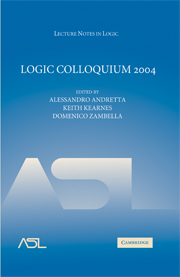Book contents
- Frontmatter
- Contents
- Introduction
- Speakers and Titles
- Abstract elementary classes: some answers, more questions
- On the density of Hausdorff ultrafilters
- Zero-groups and maximal tori
- Constructive set theory with operations
- Parametrized local zeta functions
- Colourings of hypergraphs, permutation groups and CSP's
- Tolerance intersection properties and subalgebras of squares
- Universes in type theory part I—Inaccessibles and Mahlo
- Hausdorff-dimension and weak truth-table reducibility
- Computation and the explanation of intelligent behaviours: ethologically motivated restart
- Constructible sheaves and definability
- An overview of modern universal algebra
- Lecture Notes in Logic
Constructive set theory with operations
Published online by Cambridge University Press: 05 July 2014
- Frontmatter
- Contents
- Introduction
- Speakers and Titles
- Abstract elementary classes: some answers, more questions
- On the density of Hausdorff ultrafilters
- Zero-groups and maximal tori
- Constructive set theory with operations
- Parametrized local zeta functions
- Colourings of hypergraphs, permutation groups and CSP's
- Tolerance intersection properties and subalgebras of squares
- Universes in type theory part I—Inaccessibles and Mahlo
- Hausdorff-dimension and weak truth-table reducibility
- Computation and the explanation of intelligent behaviours: ethologically motivated restart
- Constructible sheaves and definability
- An overview of modern universal algebra
- Lecture Notes in Logic
Summary
Abstract. We present an extension of constructive Zermelo–Fraenkel set theory [2]. Constructive sets are endowed with an applicative structure, which allows us to express several set theoretic constructs uniformly and explicitly. From the proof theoretic point of view, the addition is shown to be conservative. In particular, we single out a theory of constructive sets with operations which has the same strength as Peano arithmetic.
Introduction. The general context of this article is an investigation of foundational frameworks for constructive mathematics in the style of Bishop. In the early seventies, prompted by Bishop's monograph Foundations of Constructive Analysis [9], various formal systems emerged to provide a clear and precise basis for the newborn mathematical style. Completely new systems were introduced like Feferman's explicit mathematics [16] and Martin–Löf's type theory [23, 24]. In addition, various systems in the form of the Zermelo–Fraenkel axiomatization but based on intuitionistic logic were put forward for example by Friedman [20, 21], Myhill [27] and Aczel [2, 4, 5]. The latter author was motivated by Myhill's Constructive set theory [28] in which a system of sets and functions was introduced adhering to a (generalized) predicative approach. Constructive set theory thus avoided the use of unbounded forms of separation and of the full axiom of powerset. Aczel brought these ideas in a system expressed in the language of Zermelo–Fraenkel set theory and also provided a natural interpretation for it in a version of Martin–Löf's type theory with a universe of small types and an inductive type built over it.
Information
- Type
- Chapter
- Information
- Logic Colloquium 2004 , pp. 47 - 83Publisher: Cambridge University PressPrint publication year: 2007
Accessibility standard: Unknown
Why this information is here
This section outlines the accessibility features of this content - including support for screen readers, full keyboard navigation and high-contrast display options. This may not be relevant for you.Accessibility Information
- 3
- Cited by
